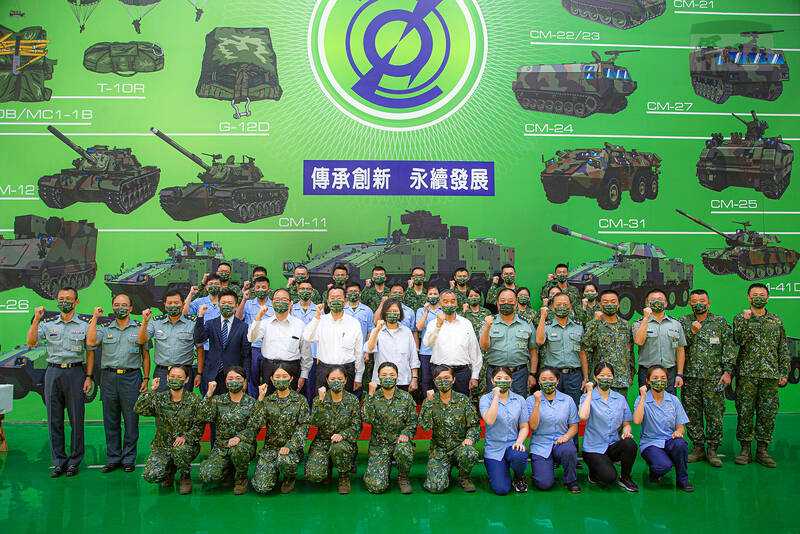The government should prioritize use of its fiscal 2023 national defense budget — estimated at NT$586.3 billion (US$18.98 billion) — on building the military’s asymmetric combat capabilities and procuring more and better equipment, the Taiwan People’s Party (TPP) caucus said yesterday.
Taiwan’s standing army is only one-10th the size of the Chinese People’s Liberation Army (PLA), and it is urgent that the military improve its asymmetric warfare capability, TPP caucus convener Chiu Chen-yuan (邱臣遠) told a news conference at the legislature in Taipei.
Despite racking up NT$1.7 trillion in expenditures for purchasing weapons, more than 70 percent of the military’s equipment is antiquated, he said.

Photo: Tu Chien-jung, Taipei Times
The TPP has been vocal in its criticism of the military’s combat armor, saying the military claimed that its “bulletproof” vest could withstand a 7.62mm bullet, but it proved ineffective against a locally made 5.56mm armor-piercing round.
That means it would not be able to withstand Chinese guns, which use 5.8mm rounds, it said.
The Ministry of National Defense should review its arms purchases and see if they align with the military’s aims, Chiu said.

Photo courtesy of the Presidential Office via CNA
The government should also improve its indigenous armament program to reduce pressure on weapons and equipment procurement, he said.
The military should endeavor to upgrade soldiers’ equipment and provide troops the equivalent of the US’ improved first aid kits, which the US Army has proven to reduce infantry death rates by 15 to 20 percent, Chiu added.
The annual increase in defense spending has not resulted in a corresponding increase in the military’s capabilities, TPP Legislator Jang Chyi-lu (張其祿) said, adding that the government is still unable to contest China’s “gray zone” tactics.
Jang cited the absence of drone-jamming equipment for garrisons on outlying islands as an example of the government’s failure to deal with Chinese incursions into the nation’s air defense identification zone in the past few years.
There is no justification to increase military spending if there are no visible benefits or results, he said.
Jang also cited the downgrading of the Jhenhai program (震海) next year to further highlight the ministry’s lack of strategic vision in its arms purchases.
“A NT$24.5 billion program, altered on a whim,” he added.
The ministry must demonstrate fiscal responsibility and use limited resources for maximum results, Jang said, adding that it must be transparent and show the public that their tax money is going to good use.

Chinese spouse and influencer Guan Guan’s (關關) residency permit has been revoked for repeatedly posting pro-China videos that threaten national security, the National Immigration Agency confirmed today. Guan Guan has said many controversial statements in her videos posted to Douyin (抖音), including “the red flag will soon be painted all over Taiwan” and “Taiwan is an inseparable part of China,” and expressing hope for expedited reunification. The agency last year received multiple reports alleging that Guan Guan had advocated for armed reunification. After verifying the reports, the agency last month issued a notice requiring her to appear and explain her actions. Guan

GIVE AND TAKE: Blood demand continues to rise each year, while fewer young donors are available due to the nation’s falling birthrate, a doctor said Blood donors can redeem points earned from donations to obtain limited edition Formosan black bear travel mugs, the Kaohsiung Blood Center said yesterday, as it announced a goal of stocking 20,000 units of blood prior to the Lunar New Year. The last month of the lunar year is National Blood Donation Month, when local centers seek to stockpile blood for use during the Lunar New Year holiday. The blood demand in southern Taiwan — including Tainan and Kaohsiung, as well as Chiayi, Pingtung, Penghu and Taitung counties — is about 2,000 units per day, the center said. The donation campaign aims to boost

The Kaohsiung Tourism Bureau audited six hotels in an effort to prevent price gouging ahead of Korean band BTS’ concert tour in the city scheduled for Nov. 19, 21 and 22 this year. The bureau on Friday said that the audits — conducted in response to allegations of unfair pricing posted on social media — found no wrongdoing. These establishments included the local branches of Chateau de Chine, Hotel Nikko, My Humble House, and Grand Hai Lai, it said, adding that the Consumer Protection Commission would have penalized price gougers had the accusations been substantiated. The bureau said the Tourism Development Act

The military yesterday said it has located the flight data recorder, or black box, of an F-16V jet that disappeared off eastern Taiwan earlier this month, and it would soon deploy a salvage team to try to retrieve it. Air Force Command Headquarters said that while it had pinned down the location of the black box, it was still searching for the aircraft’s sole pilot, air force Captain Hsin Po-yi (辛柏毅). Without providing details, the air force said it had located the black box days after detecting some intermittent signals and would now engage a team of professionals to retrieve it. The air